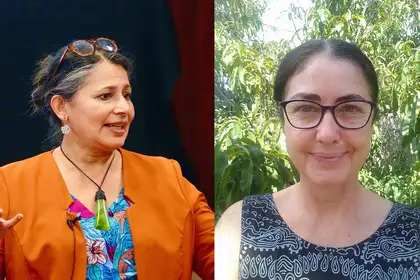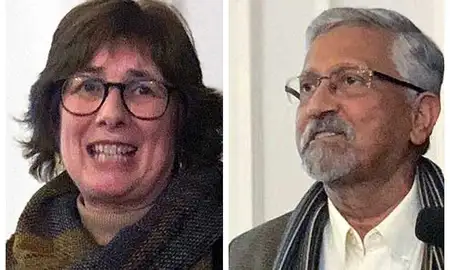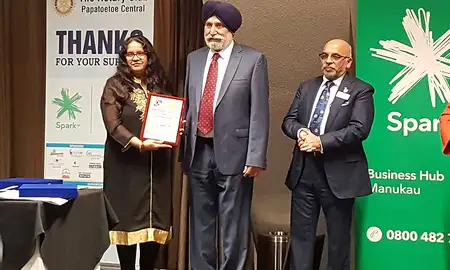
Associate Professor Sita Venkateswar (left) and Dr Vicky Walters are leading the research.
Associate Professor Sita Venkateswar and Dr Vicky Walters of the School of People, Environment and Planning have spent the past 18 months laying the groundwork for the survey, which will be followed by a series of in-depth personal interviews.
In 2022, master's student Nicole Ashley undertook a summer scholarship reviewing the existing international literature around the Indian diaspora.
Dr Walters says this gave them a really good sense of what was already being discussed across time and in different locations.
“A lot of the existing research in New Zealand looks at the relationship between the Indian diaspora and the non-Indian community. Our point of difference is that we're much more interested in looking at the internal nuances of how the Indian diaspora in Aotearoa New Zealand interact and engage amongst themselves.”
The survey will explore the ways in which people identify themselves as Indian and what that means in practice in a location far from the original context.
“As we know, India is a very diverse country, and that diversity is also reflected in the diaspora. How does that play out in terms of their daily lives with family and community? What does community mean in this context?" Dr Venkateswar says.
Dr Walters says the survey will identify if respondents are first, second, third or older generation in New Zealand.
“We are hoping to capture the diversity and everyday lives of the Indian diaspora across generations, across gender, across different kinds of living arrangements, in terms of the respondents’ geographical affiliations to different parts of India. And also recognising that there is religious and faith-based diversity as well as caste diversity."
Dr Venkateswar describes the survey as the ‘tip of the iceberg’, saying the next stage of personal interviews will be much more in-depth and longer.
The survey will be administered online and promoted with the assistance of a variety of Indian community organisations and social media. A pilot currently underway has generated helpful feedback resulting in further fine-tuning of the questions before the survey itself is launched.
Dr Walters says it has to be right the first time.
“Sita and I are primarily ethnographers who undertake qualitative research. But with this survey we’re making a shift into quantitative research and on a large scale so we have a technical team, including Nicole Ashley, who are supporting us behind the scenes with survey development and administration.”
Some 240,000 people, or five per cent of the total population, identified as Indian in the 2018 Census. The researchers are targeting a sample size of at least 1,350 to ensure a wide representation of the community, with multiple segmentations possible.
Dr Walters says, “Of course some of the questions in the survey are rather pragmatic, like where were you born or the respondent’s age. But we’ve also tried to create some fun, interesting questions to answer which are indicators of some quite important things. Just little scenario-based questions: How comfortable would you be in this situation?”
Dr Venkateswar says they will be looking at the extent to which the linguistic and cultural diversity grounded in the Indian subcontinent presents barriers, or challenges, or constraints, or imposes restrictions to those among the Indian diaspora and whether respondents recognise these in their day-to-day lives and social connections.
“We’ll also be looking at the generational shifts in knowledge and understanding. The extent to which various components of identity that were fiercely held on to in the first generation may or may not be even acknowledged or tangible in succeeding generations.”
She adds that there are boundaries and separations in everyday practices, like house cleaning, which are part of what it means to be Indian.
“It’s not visible to others, but it is very embodied and inherent. That is the kind of intangible thing we are tapping into – those little delicate things that shape values and how you live.”
The research seeks to break down the notion that people identifying as being part of the Indian diaspora in New Zealand are a homogeneous group sharing similar values, practices, beliefs and ways of being in the world.
Once the survey results have been analysed and written up, the plan is to create a series of storyboards – small graphic stories that can be communicated back to the Indian diaspora and the wider community.
The two researchers met in 2006 and have worked together in the past. Sociologist Dr Walters has travelled frequently to India to conduct research on various aspects of urban development such as homelessness, water governance and sanitation issues.
Anthropologist Dr Venkateswar is herself a first generation Indian who migrated to New Zealand 26 years ago to take up her position at Massey. Born in Bombay, raised in Calcutta, and having spent time in the United States, she says the shift to Palmerston North in 1997 came as a bit of culture shock.
“There’s been a huge sea change since then. When I arrived, Palmerston North was just opening out from being a small provincial town. Because it’s a university town, diversity is built into the population. But now it’s much more visibly diverse, especially since becoming a centre for refugee resettlement.
“It was an easy, welcoming place for me to make a life and put my roots down.”
Related news
Books offer new angles on diverse Anglo-Indian identities
Two new books are the latest culmination of social anthropologist Dr Robyn Andrew's extensive research on Anglo-Indian communities: their contemporary life, history and traditions.

Fin-Ed Centre director recognised by Indian community
Dr Pushpa Wood has received the Indian Diaspora Award in recognition of her contribution to education and improving New Zealanders' financial capability.
